Items filtered by date: January 2023
Yoga and the Feet
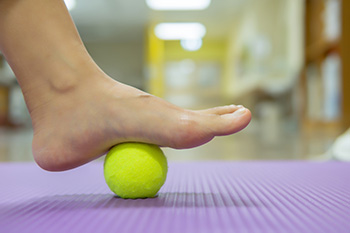
The health of our feet can play a significant role in increasing the efficacy and ease of our physical exercises and workouts. Interestingly, our feet can largely influence other parts of the human body and their performance during yoga sessions. Yoga is a popular form of exercise that disciplines the mind, body, and spirit through the practice of different yoga poses. When an individual engages in yoga with healthy feet, this can positively impact the tone of the pelvic floor. This is because the feet are linked with and mirror the pelvic floor during yoga sessions. Additionally, yoga enthusiasts who have strong and resilient feet can strengthen their perineal muscles. Needless to say, those who practice yoga can reap many benefits from simply strengthening their feet. Contact a podiatrist today for more information about this subject.
Exercising your feet regularly with the proper foot wear is a great way to prevent injuries and build strength. If you have any concerns about your feet, contact one of our podiatrists from ABC Podiatry. Our doctors can provide the care you need to keep you pain-free and on your feet.
Exercise for Your Feet
Exercise for your feet can help you gain strength, mobility and flexibility in your feet. They say that strengthening your feet can be just as rewarding as strengthening another part of the body. Your feet are very important, and we often forget about them in our daily tasks. But it is because of our feet that are we able to get going and do what we need to. For those of us fortunate enough to not have any foot problems, it is an important gesture to take care of them to ensure good health in the long run.
Some foot health exercises can include ankle pumps, tip-toeing, toe rises, lifting off the floor doing reps and sets, and flexing the toes. It is best to speak with Our doctors to determine an appropriate regimen for your needs. Everyone’s needs and bodies are different, and the activities required to maintain strength in the feet vary from individual to individual.
Once you get into a routine of doing regular exercise, you may notice a difference in your feet and how strong they may become.
If you have any questions please feel free to contact our office located in Columbus, OH . We offer the newest diagnostic and treatment technologies for all your foot and ankle needs.
Bunions and Foot Baths
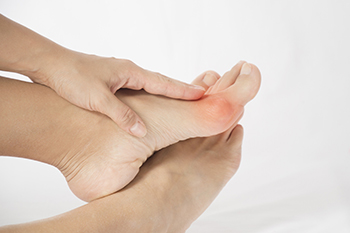
Bunions are a bony kind of bump that can develop on the outer side of the big toe or the pinky toe. Bunions have the potential to cause the individual a significant amount of discomfort. Bunions are typically something that patients will want to treat, and there are many ways in which one might go about treating their bunions. For example, an individual with bunions might choose to use the power of foot baths. Sometimes, individuals suffering from bunions can experience some kind of stiffness in their big toes due to the bunion. Immersing the feet in a warm foot bath can significantly help to mitigate feelings of stiffness. If a warm bath for the feet is not possible, then one might substitute a warm foot bath with a steamed towel. It usually helps if the towel is moist as well. If you are suffering from bunions, contact a podiatrist today for an appointment.
If you are suffering from bunions, contact one of our podiatrists of ABC Podiatry. Our doctors can provide the care you need to keep you pain-free and on your feet.
What Is a Bunion?
A bunion is formed of swollen tissue or an enlargement of boney growth, usually located at the base joint of the toe that connects to the foot. The swelling occurs due to the bones in the big toe shifting inward, which impacts the other toes of the foot. This causes the area around the base of the big toe to become inflamed and painful.
Why Do Bunions Form?
Genetics – Susceptibility to bunions are often hereditary
Stress on the feet – Poorly fitted and uncomfortable footwear that places stress on feet, such as heels, can worsen existing bunions
How Are Bunions Diagnosed?
Doctors often perform two tests – blood tests and x-rays – when trying to diagnose bunions, especially in the early stages of development. Blood tests help determine if the foot pain is being caused by something else, such as arthritis, while x-rays provide a clear picture of your bone structure to your doctor.
How Are Bunions Treated?
- Refrain from wearing heels or similar shoes that cause discomfort
- Select wider shoes that can provide more comfort and reduce pain
- Anti-inflammatory and pain management drugs
- Orthotics or foot inserts
- Surgery
If you have any questions, please feel free to contact our office located in Columbus, OH . We offer the newest diagnostic and treatment technologies for all your foot care needs.
What Does a Plantar Wart Look Like?
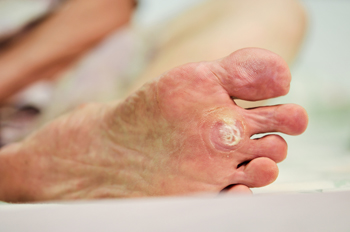
As painful as a plantar wart can be, it is considered to be a harmless skin growth. It is a small area of hardened skin that is sometimes filled with black dots, which are blood vessels. It is caused by a fungus and develops on the sole of the foot. It generally grows inward as a result of the pressure the bottom of the foot endures from body weight. Many people experience extreme discomfort with a plantar wart and often look for prompt medical attention for relief. They are considered to be contagious, and it is beneficial to refrain from sharing towels, shoes, and socks. Medicine may be prescribed that can freeze the wart, or for stubborn plantar warts, surgery may be necessary for removal. It is beneficial to choose shoes that are comfortable, and avoid wearing any type of shoe that puts pressure on the heels. Some patients find it helpful to put a protective covering over the wart which may help to ease the pressure that is felt from walking. If you have developed a plantar wart, it is strongly urged that you are under the care of a podiatrist who can guide you toward the necessary treatment.
Plantar warts can be very uncomfortable. If you need your feet checked, contact one of our podiatrists from ABC Podiatry. Our doctors will assist you with all of your foot and ankle needs.
About Plantar Warts
Plantar warts are the result of HPV, or human papillomavirus, getting into open wounds on the feet. They are mostly found on the heels or balls of the feet.
While plantar warts are generally harmless, those experiencing excessive pain or those suffering from diabetes or a compromised immune system require immediate medical care. Plantar warts are easily diagnosed, usually through scraping off a bit of rough skin or by getting a biopsy.
Symptoms
- Lesions on the bottom of your feet, usually rough and grainy
- Hard or thick callused spots
- Wart seeds, which are small clotted blood vessels that look like little black spots
- Pain, discomfort, or tenderness of your feet when walking or standing
Treatment
- Freezing
- Electric tool removal
- Laser Treatment
- Topical Creams (prescription only)
- Over-the-counter medications
To help prevent developing plantar warts, avoid walking barefoot over abrasive surfaces that can cause cuts or wounds for HPV to get into. Avoiding direct contact with other warts, as well as not picking or rubbing existing warts, can help prevent the further spread of plantar warts. However, if you think you have developed plantar warts, speak to your podiatrist. He or she can diagnose the warts on your feet and recommend the appropriate treatment options.
If you have any questions please feel free to contact our office located in Columbus, OH . We offer the newest diagnostic and treatment technologies for all your foot and ankle needs.
Do Your Child's Feet Hurt?
Medical Conditions May Cause Cracked Heels
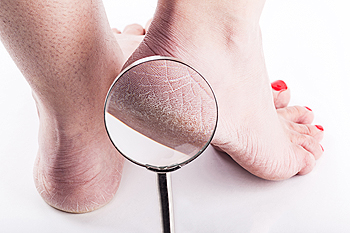
Cracked heels are an uncomfortable foot condition that can develop for various reasons. These can include wearing shoes that do not have a back or standing on hard surfaces for most of the day. Dry skin may also contribute to developing cracked heels and may come from having specific medical conditions. These can include eczema, psoriasis, or hyperkeratosis, which can happen from participating in sporting activities that consistently rub the skin. Additionally, a thyroid disorder may cause the skin to become dry, possibly leading to cracked heels, and it is not uncommon for diabetic patients to have this condition as well. Mild relief may be found when the feet are soaked in warm water, followed by applying a good moisturizer. Wearing cushioned socks may help to protect the heels from rubbing against the shoes. Cracked heels can become infected so it is strongly suggested that you are under the care of a podiatrist who can prescribe medication that can begin effective treatment.
Cracked heels are unsightly and can cause further damage to your shoes and feet. If you have any concerns, contact one of our podiatrists from ABC Podiatry. Our doctors can provide the care you need to keep you pain-free and on your feet.
Cracked Heels
Cracked heels appear unappealing and can make it harder for you walk around in sandals. Aside from looking unpleasant, cracked heels can also tear stockings, socks, and wear out your shoes. There are several methods to help restore a cracked heel and prevent further damage.
How Do You Get Them?
Dry skin is the number one culprit in creating cracked heels. Many athletes, walkers, joggers, and even swimmers suffer from cracked heels. Age and skin oil production play a role to getting cracked heels as well.
Promote Healing
Over the counter medicines can help, especially for those that need instant relief or who suffer from chronic dry feet.
Wear Socks – Wearing socks with medicated creams helps lock in moisture.
Moisturizers – Applying both day and night will help alleviate dryness which causes cracking.
Pumice Stones – These exfoliate and remove dead skin, which allows for smoother moisturizer application and better absorption into the skin.
Change in Diet
Eating healthy with a well-balanced diet will give the skin a fresh and radiant look. Your body responds to the kinds of food you ingest. Omega-3 fatty acids and zinc supplements can also revitalize skin tissue.
Most importantly, seek professional help if unsure how to proceed in treating cracked heels. A podiatrist will help you with any questions or information needed.
If you have any questions, please feel free to contact our office located in Columbus, OH . We offer the newest diagnostic and treatment technologies for all your foot care needs.
How Can I Prevent Toenail Fungus?
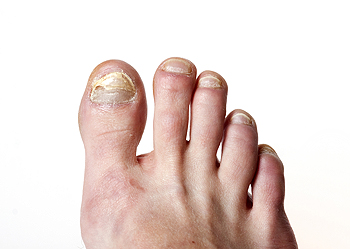
Toenail fungus is undoubtedly an unpleasant, unsightly, and potentially uncomfortable condition that can affect just about anyone. Since this condition can make the nails appear discolored and in bad form, many patients of podiatrists are curious about how they might go about preventing toenail fungus from developing. The good news is that there are several steps that an individual might take to prevent toenail fungus. If a patient uses antifungal sprays or powders, then this might significantly improve the patient’s resistance to developing a toenail fungus. Additionally, when a person properly cares for their nails, this can significantly help protect the nails from becoming infected. This includes properly cutting the nails, and ensuring that they are clean. If you are worried about preventing toenail fungus, you can make an appointment with a podiatrist today. This foot specialist will help you address your problems.
For more information about treatment, contact one of our podiatrists of ABC Podiatry. Our doctors can provide the care you need to keep you pain-free and on your feet.
Toenail Fungus Treatment
Toenail fungus is a condition that affects many people and can be especially hard to get rid of. Fortunately, there are several methods to go about treating and avoiding it.
Antifungals & Deterrence
Oral antifungal medicine has been shown to be effective in many cases. It is important to consult with a podiatrist to determine the proper regiment for you, or potentially explore other options.
Applying foot powder on the feet and shoes helps keep the feet free of moisture and sweat.
Sandals or open toed shoes – Wearing these will allow air movement and help keep feet dry. They also expose your feet to light, which fungus cannot tolerate. Socks with moisture wicking material also help as well.
If you have any questions please feel free to contact our office located in Columbus, OH . We offer the newest diagnostic tools and technology to treat your foot and ankle needs.





